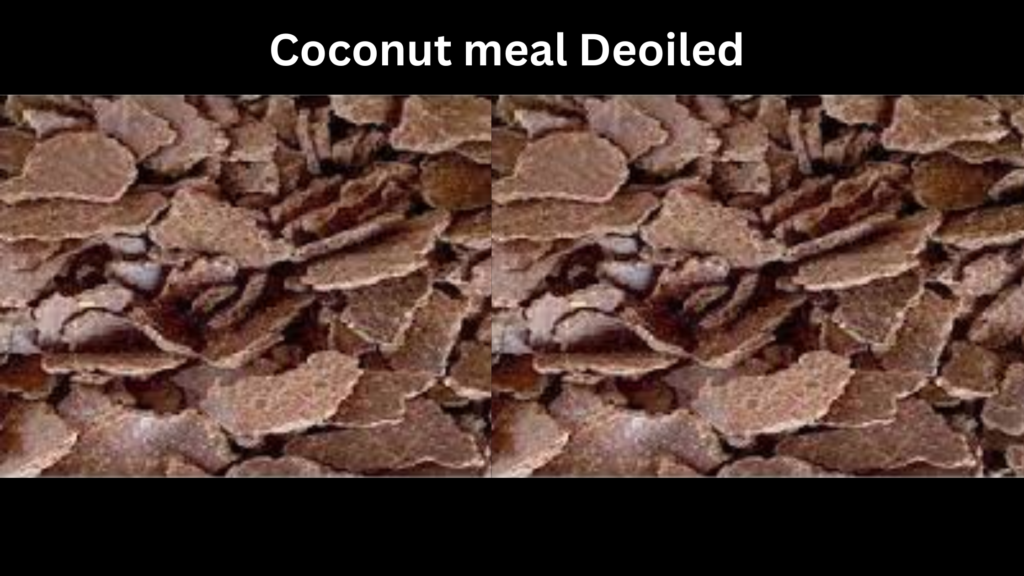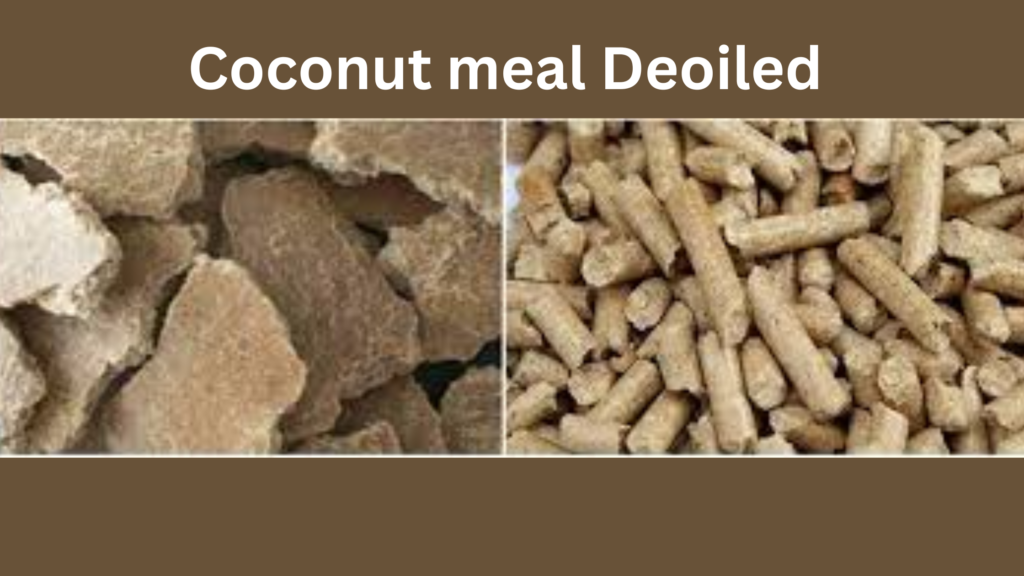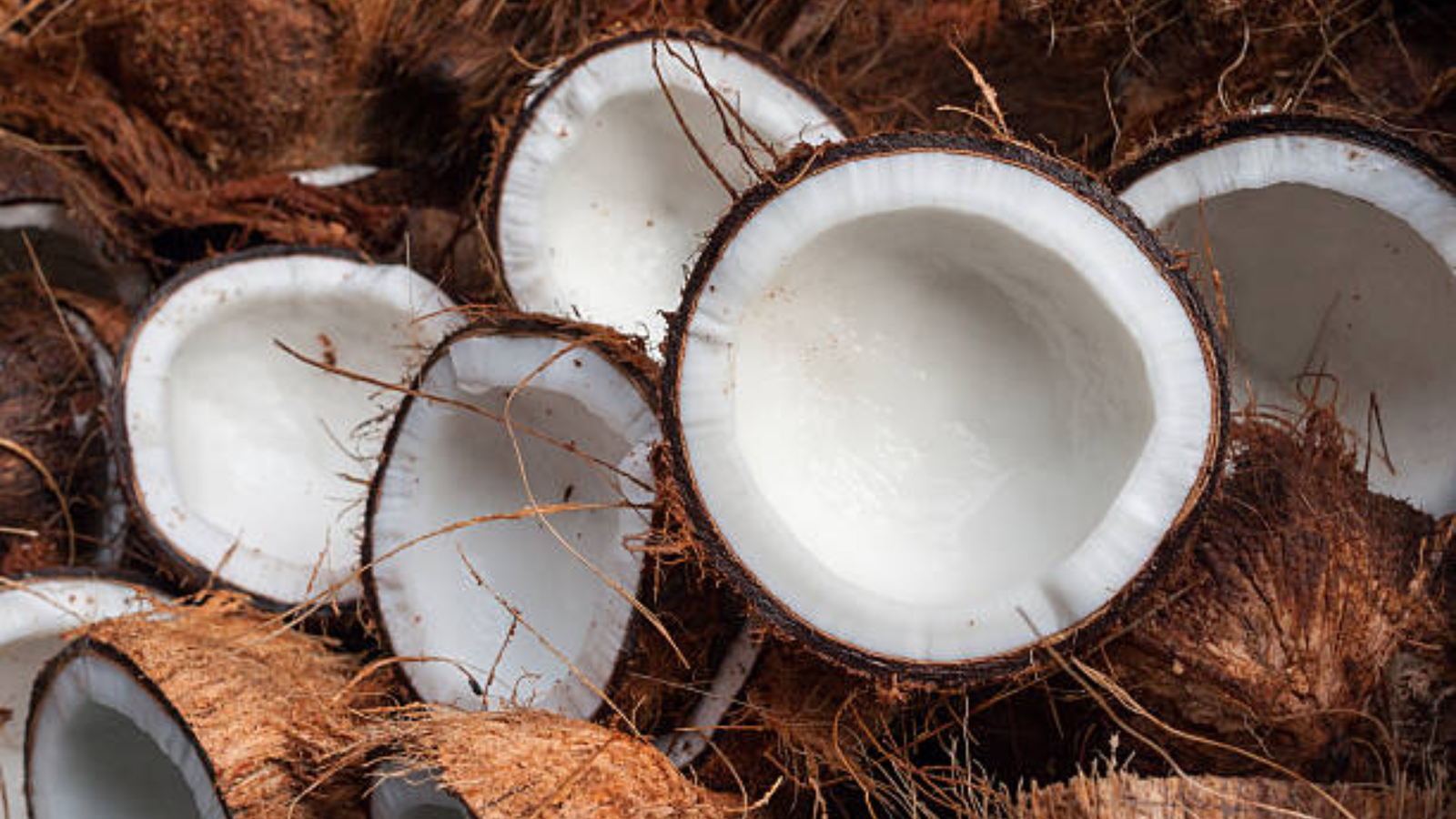Introduction
Coconut meal, a by-product of coconut oil extraction, has won considerable attention recently due to its versatile applications in numerous industries. One such product is a coconut meal deoiled, produced after oil extraction from the coconut meal. This newsletter offers an in-depth knowledge of coconut meal deoiled, its production process, nutritional profile, advantages, packages, and capability impact on one-of-a-kind sectors.
What’s Coconut Meal Deoiled?
Coconut meal deoiled, or defatted coconut meal, or coconut flour is the spinoff left after the oil has been extracted from the coconut ( khopra ). This procedure eliminates the maximum oil content, leaving a nutrient-rich, fibrous meal. The deoiled coconut meal is a valuable product with many applications, especially within the food, feed, and agricultural industries.
Manufacturing process
Harvesting and Drying
The manufacturing of coconut meal deoiled started with the harvesting of mature coconuts. Once harvested, the coconuts are dehusked and broken up to separate the meat from the shell. The coconut meat is then dried with sun or mechanical drying methods to reduce its moisture content. This dried coconut meat is called copra.
Oil Extraction
The dried copra is then subjected to an oil extraction procedure, which may be completed using mechanical expellers or solvent extraction strategies. Mechanical expellers use pressure to extract the oil, while solvent extraction includes using chemical substances to dissolve the oil. Each technique successfully removes the general public of the oil content material from the copra, leaving it at the back of the deoiled coconut meal.
In addition Processing
After oil extraction, the deoiled coconut meal undergoes similar processing to meet first-rate requirements. It could include grinding, sieving, and drying to gain a steady particle size and moisture content material. The by-product is then packaged and prepared for distribution.

Nutritional Profile
Coconut meal deoiled is a nutrient-dense product, rich in fiber, protein, and crucial minerals. The elimination of oil does now not appreciably lessen its nutritional value. Here’s a breakdown of its vital dietary additives:
Fiber
Coconut meal deoiled is an excellent dietary fiber source critical for healthy digestion. The excessive fiber content material promotes bowel regularity, prevents constipation, and aids common gut fitness.
Protein
Protein is every other sizeable aspect of coconut meal deoiled. It contains amino acids for muscle growth, restoration, and ordinary frame features. It makes it a treasured factor for those trying to increase their protein consumption, mainly in plant-based diets.
Minerals
Coconut meal deoiled is rich in minerals together with iron, magnesium, and zinc. Iron is essential for oxygen circulation within the blood; magnesium helps muscle and nerve features, and zinc functions in immune characteristics and wound recovery.
Low fat
As the name indicates, coconut meal deoiled has a low fat content because of oil removal at some stage in the extraction procedure. It makes it an appropriate option for those seeking to reduce fat consumption without compromising nutritional price.
Health blessings
Digestive fitness
The high fiber content in coconut meal deoiled helps digestive fitness by selling regular bowel movements and stopping constipation. It also aids in preserving a healthy intestine microbiome critical for universal health and well-being.
Weight management
Incorporating coconut meal deoiled into the eating regimen can be a resource in weight control. The fiber content helps grow satiety, reducing universal calorie intake. Additionally, the low-fat nature of the product makes it a suitable option for those trying to control their weight effectively.
Blood Sugar regulation
The fiber in coconut meal deoiled can also assist in adjusting blood sugar levels by slowing down the absorption of sugar into the bloodstream. It can be particularly beneficial for people with diabetes or those liable to grow the condition.
Heart Fitness
Coconut meal deoiled contributes to heart health by providing crucial vitamins, magnesium, and fiber. Magnesium facilitates keeping healthy blood pressure ranges, while the quantity of fiber can help lower cholesterol levels, reducing the danger of coronary heart sickness.

Applications within the meals industry
Baking and Cooking
Coconut meal deoiled is broadly utilized in baking and cooking due to its specific taste and dietary blessings. It could be used as a substitute for wheat flour in numerous recipes, making it a fantastic option for gluten-free baking. Its excessive fiber content material additionally adds texture and moisture to baked goods.
Protein Bars and Snacks
The protein-rich nature of coconut meal deoiled makes it great for protein bars and snacks. It offers a natural supply of protein without additional supplements, making it a famous choice amongst health-aware purchasers.
Beverages
Coconut meal deoiled can be used to manufacture drinks consisting of smoothies and protein shakes. It makes a creamy texture and enhances the nutritional profile of the drinks, making them more excellent, filling, and pleasing.
Dairy options
For those searching for dairy alternatives, coconut meal deoiled can create plant-primarily based milk and yogurt. The sweetness and creamy texture make it an appropriate replacement for traditional dairy merchandise.
Programs in Animal Feed
Farm animals Feed
Coconut meal deoiled is a treasured factor in livestock products due to its high protein and fiber content. It presents crucial vitamins for the boom and improvement of animals, making it a value-powerful feed alternative for farmers.
Chicken Feed
In poultry feed, coconut meal deoiled serves as a supply of protein and energy. It facilitates improving fowl’s general health and productiveness, mainly through higher egg manufacturing and first-class meat.
Puppy food
The puppy meals industry also advantages from the inclusion of coconut meal deoiled. It provides a herbal source of pet vitamins, promoting healthy digestion and typical well-being.
Agricultural applications
Natural Fertilizer
Coconut meal deoiled can be used as a natural fertilizer because of its high nutrient content. It improves soil fertility, enhances plant growth, and increases crop yield, making it a treasured addition to sustainable farming practices.
Soil Conditioner
Similarly to its use as a fertilizer, coconut meal deoiled can also act as a soil conditioner. It enhances soil structure, water retention, and aeration, growing favorable surroundings for plant boom.
Environmental effect
Sustainable manufacturing
The manufacturing of coconut meal deoiled aligns with sustainable practices as it uses by-products of the coconut oil industry. It reduces waste and maximizes the usage of to-be-had sources, contributing to environmental sustainability.
Decreased Carbon Footprint
Industries can lessen their carbon footprint by incorporating coconut meal deoiled into various merchandise. Using plant-primarily based components over animal-based or synthetic alternatives decreases greenhouse gasoline emissions and promotes a more sustainable meal device.

Challenges and considerations
Best manage
Preserving regular satisfaction in the production of coconut meal deoiled can be challenging. Variations in raw substances, processing techniques, and storage situations can affect the quality of the last product. Enforcing stringent first-class management measures is essential to ensure a first-rate product.
Marketplace competition
The marketplace for plant-based elements is very aggressive, with several options. Coconut meal deoiled should compete with different plant-based total flours and protein sources, necessitating powerful advertising strategies and product differentiation.
Purchaser awareness
Growing purchaser focus on the blessings and packages of coconut meal deoiled is critical for market increase. Educating purchasers about its nutritional profile, fitness advantages, and versatility can drive the call for and extend its marketplace presence.
Implications
Innovation in Product development
The future of coconut meal deoiled lies in innovation and product improvement. Research and improvement efforts can lead to the advent of new and progressed merchandise that cater to evolving purchaser alternatives and nutritional traits.
Enlargement into New Markets
Increasing into new markets, geographically and demographically, affords ample boom opportunities. Concentrating on health-conscious clients, athletes, and people with nutritional regulations can assist in expanding the consumer base for coconut meal deoiled products.
Collaboration with meal manufacturers
Participating with meal producers can decorate the visibility and accessibility of coconut meal deoiled. By incorporating it right into a vast range of meal products, producers can offer healthier alternatives to standard ingredients, meeting the needs of present-day consumers.
Conclusion
Coconut meal deoiled is a flexible and nutrient-rich product with several applications within the food, feed, and agricultural industries. Its production technique guarantees that the treasured nutrients of the coconut are retained, making it a treasured factor for promoting fitness and sustainability. As patron demand for plant-primarily based, nutritious, and sustainable products continues to rise, coconut meal deoiled is poised to play a widespread position in shaping the future of these industries. With ongoing innovation and improved purchaser cognizance, the potential for coconut meal deoiled is sizeable, promising a more fit and extra sustainable destiny for all.



